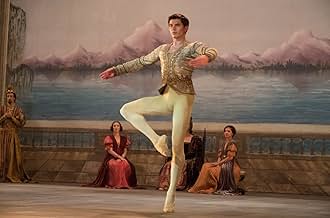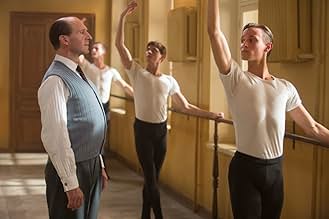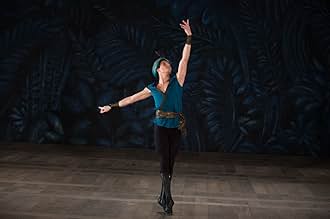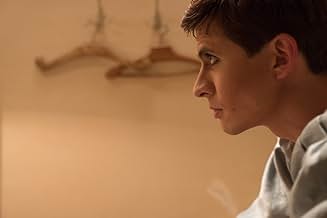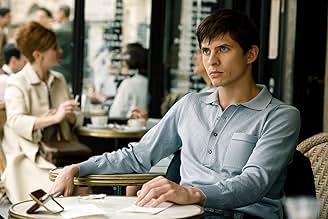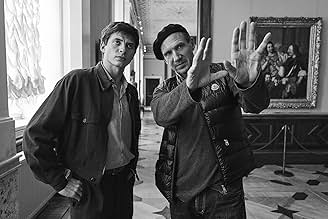IMDb-BEWERTUNG
6,6/10
7249
IHRE BEWERTUNG
Die Geschichte von Rudolf Nurejews Übertritt in den Westen.Die Geschichte von Rudolf Nurejews Übertritt in den Westen.Die Geschichte von Rudolf Nurejews Übertritt in den Westen.
- Regie
- Drehbuch
- Hauptbesetzung
- Auszeichnungen
- 1 Gewinn & 4 Nominierungen insgesamt
Empfohlene Bewertungen
'The White Crow' tells of Soviet ballet star Rudolf Nureyev's defection to the West in Paris, 1961. And of his years training in Leningrad. And of his poverty-stricken childhood. Three strands running concurrently through the film make for a busy production. The childhood scenes do little more than establish that Nureyev grew up surrounded by poverty and lots of snow. The Leningrad scenes show him as willing to work for his craft, but intense, self-centred and very arrogant - a proper little diva, in fact. Six years later, in Paris, he is still arrogant - demanding, for example, that a French female companion talk to a Russian waiter on his behalf because he suspects the man of looking down on him. But the intensity has weakened, replaced by an interest in what is around him and a happy curiosity in new things. This, however, does not please his KGB minders.
The film is the third from Ralph Fiennes wearing his director's hat. He does a pretty good job: the childhood scenes are shot in bleak, washed-out colours - almost black-and-white - a clever decision which creates atmosphere; and the climactic defection scene in Le Bourget Airport is heavy with tension. There *are* directoral flaws - something as simple as, for example, giving leading man Oleg Ivenko a different haircut for each era would have prevented this viewer's occasional confusion as to whether I was watching 1960s' Paris Nureyev or the 1950s' Leningrad version! And did we need quite so many extreme close-ups of Ivenko's face? But overall, director Fiennes does a good job...
... which makes it a shame that actor Fiennes turns in one of the weakest performances of the film. His portrayal of Nureyev's teacher Pushkin may, for all I know, be true to the real man, but I found it dreadfully studied and mannered, producing a caricature rather than a character (I will, however, give Fiennes full marks for delivering most of his lines in Russian!) Ukrainian dancer Ivenko, in what according to IMDb is his first acting role, turns in a more naturalistic performance, albeit within the confines of the generously-proportioned ego he is portraying. My personal favourite, however, was Chulpan Khamatova in a nicely-judged portrayal of Pushkin's wife Xenia, whose initial motherly interest in Nureyev (prompted by her husband's concern the stroppy teenager is not eating enough) develops over the course of the film.
Seen in preview at the British Film Institute, and - containing good pacing, an interesting story and nicely-rendered period detail - well worth it.
The film is the third from Ralph Fiennes wearing his director's hat. He does a pretty good job: the childhood scenes are shot in bleak, washed-out colours - almost black-and-white - a clever decision which creates atmosphere; and the climactic defection scene in Le Bourget Airport is heavy with tension. There *are* directoral flaws - something as simple as, for example, giving leading man Oleg Ivenko a different haircut for each era would have prevented this viewer's occasional confusion as to whether I was watching 1960s' Paris Nureyev or the 1950s' Leningrad version! And did we need quite so many extreme close-ups of Ivenko's face? But overall, director Fiennes does a good job...
... which makes it a shame that actor Fiennes turns in one of the weakest performances of the film. His portrayal of Nureyev's teacher Pushkin may, for all I know, be true to the real man, but I found it dreadfully studied and mannered, producing a caricature rather than a character (I will, however, give Fiennes full marks for delivering most of his lines in Russian!) Ukrainian dancer Ivenko, in what according to IMDb is his first acting role, turns in a more naturalistic performance, albeit within the confines of the generously-proportioned ego he is portraying. My personal favourite, however, was Chulpan Khamatova in a nicely-judged portrayal of Pushkin's wife Xenia, whose initial motherly interest in Nureyev (prompted by her husband's concern the stroppy teenager is not eating enough) develops over the course of the film.
Seen in preview at the British Film Institute, and - containing good pacing, an interesting story and nicely-rendered period detail - well worth it.
A 'white crow' in the Russian idiom is someone who stands out from others because of their appearance or behaviour. Rudolph Nureyev was, and for many still is, the white crow in the world of male ballet dancers. With extraordinary athleticism and sharply chiselled features, he defied gravity and glamorised male dancing. He also managed to make the KGB look flatfooted when he famously defected to the West.
We first see the young Rudolph as a six-year old child prodigy plucked from a poor background. The film flashes-back to these early scenes several times to remind viewers that despite his majestic aura on stage, he came from humble origins. The adult Rudolph (Oleg Ivenko) was a volatile personality both on and off stage. KGB spies watched elite dancers closely because ballet was a major cultural propaganda tool at the height of the Cold War. Rudolph was known to praise creative freedoms in the West and his secret sexuality was seen as a potential source of political embarrassment.
Most of the film builds the context in which Rudolph would commit what Russians believed was the ultimate act of treason. Barely enough camera time is devoted to his ballet lessons and performances, but what is shown will please devotees of the artform. A major sub-narrative is the live-in mentoring by his teacher Pushkin (Ralph Fiennes) and his relationships with Pushkin's wife Xenia (Chulpan Khamatova) and socialite Clara Saint (Adele Exarchopoulos). Rather than meaningful affairs, these relationships show Rudolph's willingness to exploit anyone who could advance his dancing career.
The film's modest tension curve spikes a few times during Rudolph's fiery temper tantrums, but it jumps steeply during the climactic defection scenes. The camera almost neurotically switches from close-ups on the faces of Russian spies, American observers, Rudolph and Clara, all while in the transit area of a French airport. When Rudolph is stopped from boarding a flight to his next performance, the KGB falsely tell him he has been summoned to a gala performance for the Kremlin. He is thrust into a vortex of disbelief, terror, and the realisation that if he seeks political asylum he will never set foot again in his homeland nor see his family.
Despite its uneven pace and meandering narrative arc, this powerful non-fiction storytelling is backed up with excellent acting performances and cinematography. The Cold War tensions are palpable and the political battle lines drawn clearly. You do not need to be a ballet fan to appreciate this film.
Director: Ralph Fiennes Stars: Oleg Ivenko, Ralph Fiennes, Adele Exarchopoulos, Chulpan Khamatova
We first see the young Rudolph as a six-year old child prodigy plucked from a poor background. The film flashes-back to these early scenes several times to remind viewers that despite his majestic aura on stage, he came from humble origins. The adult Rudolph (Oleg Ivenko) was a volatile personality both on and off stage. KGB spies watched elite dancers closely because ballet was a major cultural propaganda tool at the height of the Cold War. Rudolph was known to praise creative freedoms in the West and his secret sexuality was seen as a potential source of political embarrassment.
Most of the film builds the context in which Rudolph would commit what Russians believed was the ultimate act of treason. Barely enough camera time is devoted to his ballet lessons and performances, but what is shown will please devotees of the artform. A major sub-narrative is the live-in mentoring by his teacher Pushkin (Ralph Fiennes) and his relationships with Pushkin's wife Xenia (Chulpan Khamatova) and socialite Clara Saint (Adele Exarchopoulos). Rather than meaningful affairs, these relationships show Rudolph's willingness to exploit anyone who could advance his dancing career.
The film's modest tension curve spikes a few times during Rudolph's fiery temper tantrums, but it jumps steeply during the climactic defection scenes. The camera almost neurotically switches from close-ups on the faces of Russian spies, American observers, Rudolph and Clara, all while in the transit area of a French airport. When Rudolph is stopped from boarding a flight to his next performance, the KGB falsely tell him he has been summoned to a gala performance for the Kremlin. He is thrust into a vortex of disbelief, terror, and the realisation that if he seeks political asylum he will never set foot again in his homeland nor see his family.
Despite its uneven pace and meandering narrative arc, this powerful non-fiction storytelling is backed up with excellent acting performances and cinematography. The Cold War tensions are palpable and the political battle lines drawn clearly. You do not need to be a ballet fan to appreciate this film.
Director: Ralph Fiennes Stars: Oleg Ivenko, Ralph Fiennes, Adele Exarchopoulos, Chulpan Khamatova
Have always absolutely loved ballet, such fantastic music and the dancing when well choreographed and danced really entrances me. Rudolf Nureyev in this field was one of the all-time greats, so charismatic, athletic and with leaps and jumps that would be, and are, the envy of many. Also respect Ralph Fiennes very highly as an actor, particularly as tortured characters, and he had shown a lot of confidence in his previous directorial efforts.
'The White Crow' is Fiennes' third film as director, while also featuring in a not large but important role, and stands up as a very interesting and well done film when seeing it with close family friends at the cimema two days ago. All three of us really enjoyed and admired 'The White Crow', being both film and ballet fans (my love of ballet came actually through them, when watching a production of 'Swan Lake' at six years old). We later wasted no time in talking about the things the film did well, while also discussing what could have been done better.
Did feel that the back and forth between the three different timelines could have been done with more clarity and didn't feel as rushed, especially in the early stages of the film. While the childhood scenes are well made and bleakly powerful, despite showing how deprived Nureyev's childhood was and how he came to be the way he was there could have been less of them.
It would have been an even better film too if there were not as many close ups and slow shots, the former of which got slightly self-indulgent and the latter at times nauseated, and also clearer motivations as to why characters behaved the way they did. Although Nureyev's life was a volatile one and he was not easy to work with, anyone who is not familiar with him will be shocked at how his behaviour at a few points during the film is so abrupt and seemingly over the top for reasons not really gone into detail (especially the restaurant scene) that it is a wonder that he still had friends or a job. Also, and this is more an observation than a flaw really, was there anyone else who was slightly distracted by how orange Fiennes looked?
On the other hand, on the most part, 'The White Crow' looks great. The period detail in all three time periods, particularly when in Paris, is handsome and evocative and a vast majority of the film is beautifully filmed. Especially loved the intimacy of it during the dancing, whether it was when the dancers were rehearsing or were performing, and despite being initially put off by the queesiness of it during the scenes involving the defection and the lead up to it that added to the intense claustrophobia and suspense of that portion and fitted perfectly with Nureyev's state of mind. As to be expected the music is wonderful and performed musically with a lot of energy and nuance.
Similarly the dancing leaves one in awe, it is hard not to be envious of the athleticism and grace of it and of Nureyev's technique or not to admire Nureyev's dilligence. The script packs in a lot, maybe too much at times, and is thought-probing and is paced fluidly. Found the mix of English, Russian and French an interesting choice and it added to the authenticity and it does flow naturally, with the subtitles comprehension shouldn't be a problem. The story is not perfect but it to me was never dull and doesn't downplay what it was about Nureyev that attracted so many, the story highlight being easily the defection climax, the intense suspense of which made me bite my nails. Nureyev is still interesting. Did hear on a side note after the screening two ladies behind me whisper "why no Margot Fonteyn?", the answer being that the film covered what came before and during Nureyev's defection, she came later.
Fiennes directs with confidence and keen eye for detail, and the acting is as committed as the dancing. A dancer in real life, Oleg Ivenko's film debut is a wholly credible one and often excellent, he captures Nureyev's athleticism perfectly and while it is hard to match Nureyev's unique charisma Ivenko does very well there too. The supporting performances are equally fine, with the most notable being a quietly sympathetic Fiennes bravely speaking in Russian, a beautiful language and a difficult one and Fiennes masters it. Just to say, do think that the criticism 'The White Crow' has garnered on here is just strange and over-the-top, actually didn't find anything to be offended by here.
Overall, a good well done film. 7/10
'The White Crow' is Fiennes' third film as director, while also featuring in a not large but important role, and stands up as a very interesting and well done film when seeing it with close family friends at the cimema two days ago. All three of us really enjoyed and admired 'The White Crow', being both film and ballet fans (my love of ballet came actually through them, when watching a production of 'Swan Lake' at six years old). We later wasted no time in talking about the things the film did well, while also discussing what could have been done better.
Did feel that the back and forth between the three different timelines could have been done with more clarity and didn't feel as rushed, especially in the early stages of the film. While the childhood scenes are well made and bleakly powerful, despite showing how deprived Nureyev's childhood was and how he came to be the way he was there could have been less of them.
It would have been an even better film too if there were not as many close ups and slow shots, the former of which got slightly self-indulgent and the latter at times nauseated, and also clearer motivations as to why characters behaved the way they did. Although Nureyev's life was a volatile one and he was not easy to work with, anyone who is not familiar with him will be shocked at how his behaviour at a few points during the film is so abrupt and seemingly over the top for reasons not really gone into detail (especially the restaurant scene) that it is a wonder that he still had friends or a job. Also, and this is more an observation than a flaw really, was there anyone else who was slightly distracted by how orange Fiennes looked?
On the other hand, on the most part, 'The White Crow' looks great. The period detail in all three time periods, particularly when in Paris, is handsome and evocative and a vast majority of the film is beautifully filmed. Especially loved the intimacy of it during the dancing, whether it was when the dancers were rehearsing or were performing, and despite being initially put off by the queesiness of it during the scenes involving the defection and the lead up to it that added to the intense claustrophobia and suspense of that portion and fitted perfectly with Nureyev's state of mind. As to be expected the music is wonderful and performed musically with a lot of energy and nuance.
Similarly the dancing leaves one in awe, it is hard not to be envious of the athleticism and grace of it and of Nureyev's technique or not to admire Nureyev's dilligence. The script packs in a lot, maybe too much at times, and is thought-probing and is paced fluidly. Found the mix of English, Russian and French an interesting choice and it added to the authenticity and it does flow naturally, with the subtitles comprehension shouldn't be a problem. The story is not perfect but it to me was never dull and doesn't downplay what it was about Nureyev that attracted so many, the story highlight being easily the defection climax, the intense suspense of which made me bite my nails. Nureyev is still interesting. Did hear on a side note after the screening two ladies behind me whisper "why no Margot Fonteyn?", the answer being that the film covered what came before and during Nureyev's defection, she came later.
Fiennes directs with confidence and keen eye for detail, and the acting is as committed as the dancing. A dancer in real life, Oleg Ivenko's film debut is a wholly credible one and often excellent, he captures Nureyev's athleticism perfectly and while it is hard to match Nureyev's unique charisma Ivenko does very well there too. The supporting performances are equally fine, with the most notable being a quietly sympathetic Fiennes bravely speaking in Russian, a beautiful language and a difficult one and Fiennes masters it. Just to say, do think that the criticism 'The White Crow' has garnered on here is just strange and over-the-top, actually didn't find anything to be offended by here.
Overall, a good well done film. 7/10
This film tells the story of a Russian ballet dancer who defected in France during the cold war.
I can't quite believe how good this film is. The story is intense and captivating, even if you don't know about Rudi or about ballet. The dances portrayed are beautiful, the leading actors are great to look at too. The airport scene is so intense that I watched it several times. I also particularly like the fact that Clara Sant helped Rudi so much, without expecting anything in return. I enjoyed every bit of this film, and I strongly recommend it.
I can't quite believe how good this film is. The story is intense and captivating, even if you don't know about Rudi or about ballet. The dances portrayed are beautiful, the leading actors are great to look at too. The airport scene is so intense that I watched it several times. I also particularly like the fact that Clara Sant helped Rudi so much, without expecting anything in return. I enjoyed every bit of this film, and I strongly recommend it.
A biopic about Rudolf Nureyev: gifted with an exemplary technique, he is considered as the greatest classical dancer and as one of the greatest choreographers.
The actors Oleg Ivenko and Chulpan Khamatova are excellent whereas Ralph Fiennes is magnificent with a masterful interpretation of Alexander Pushkin, with restraint and sensitivity. He literally impressed me! Nevertheless, as a director, Ralph Fiennes is less convincing. He excessively insists on the haughty and unpleasant character of Rudolf Nureyev, to such a point that we almost want to slap him. In addition, the manifold alternations between the trip to Paris in 1961 (the present time) and the flashbacks (his childhood in a poor family and his debut as a dancer) are almost disturbing. I would have appreciated that Ralph Fiennes develops these different points: 1) An evocation of the trip to Vienna in 1959, formerly Western Europe, followed by a formal ban on all abroad travel formulated by the Russian Minister of Culture, which could have explained, without justifying, the oppressive and stifling behavior of the KGB members, in Paris in 1961. 2) A less dark presentation of the Soviet Union reduced to KGB members as obtuse as omnipotent. Indeed, at the beginning of the 60s, the Soviet aura was supreme: culture, science, geopolitical influence, ... For instance, the dramatic Nureyev's defection at the Paris Le Bourget Airport happened just two months after the Bay of Pigs invasion which was a significant failure for Kennedy's US foreign policy and a strong reinforcement of the relations between Cuba and the Soviet Union.
As a synthesis, the movie is excellently interpreted but the realization is slightly muddleheaded. 6/7 of 10.
The actors Oleg Ivenko and Chulpan Khamatova are excellent whereas Ralph Fiennes is magnificent with a masterful interpretation of Alexander Pushkin, with restraint and sensitivity. He literally impressed me! Nevertheless, as a director, Ralph Fiennes is less convincing. He excessively insists on the haughty and unpleasant character of Rudolf Nureyev, to such a point that we almost want to slap him. In addition, the manifold alternations between the trip to Paris in 1961 (the present time) and the flashbacks (his childhood in a poor family and his debut as a dancer) are almost disturbing. I would have appreciated that Ralph Fiennes develops these different points: 1) An evocation of the trip to Vienna in 1959, formerly Western Europe, followed by a formal ban on all abroad travel formulated by the Russian Minister of Culture, which could have explained, without justifying, the oppressive and stifling behavior of the KGB members, in Paris in 1961. 2) A less dark presentation of the Soviet Union reduced to KGB members as obtuse as omnipotent. Indeed, at the beginning of the 60s, the Soviet aura was supreme: culture, science, geopolitical influence, ... For instance, the dramatic Nureyev's defection at the Paris Le Bourget Airport happened just two months after the Bay of Pigs invasion which was a significant failure for Kennedy's US foreign policy and a strong reinforcement of the relations between Cuba and the Soviet Union.
As a synthesis, the movie is excellently interpreted but the realization is slightly muddleheaded. 6/7 of 10.
Wusstest du schon
- WissenswertesHayden Christensen, who trained extensively in ballet as a child, was first choice to star; however a persistent ankle injury prevented him from being able to perform to the standards demanded by Ralph Fiennes.
- PatzerIn a scene showing a close up of Nureyev's foot performing a tendu, the shoe he is wearing is a white split sole ballet slipper, a shoe that did not exist in the 1960s. Split sole ballet technique shoes have only been on the dance scene since the mid 1990s.
- Zitate
Claire Motte: You are with the company? Did you dance tonight?
Rudolf Nureyev: If I had danced, you would remember.
- VerbindungenFeatured in Ralph Fiennes & Oleg Ivenko in Conversation (2019)
- SoundtracksLa Bayadère 3rd Shade Variation
Composed by Ludwig Minkus
Arranged by Matthias Gohl
Performed by Ilan Eshkeri and The London Metropolitan Orchestra
Top-Auswahl
Melde dich zum Bewerten an und greife auf die Watchlist für personalisierte Empfehlungen zu.
Details
- Erscheinungsdatum
- Herkunftsländer
- Offizielle Standorte
- Sprachen
- Auch bekannt als
- Nurejew: The White Crow
- Drehorte
- Produktionsfirmen
- Weitere beteiligte Unternehmen bei IMDbPro anzeigen
Box Office
- Bruttoertrag in den USA und Kanada
- 1.828.784 $
- Eröffnungswochenende in den USA und in Kanada
- 78.782 $
- 28. Apr. 2019
- Weltweiter Bruttoertrag
- 7.622.595 $
- Laufzeit2 Stunden 7 Minuten
- Farbe
- Seitenverhältnis
- 1.85 : 1
Zu dieser Seite beitragen
Bearbeitung vorschlagen oder fehlenden Inhalt hinzufügen

Oberste Lücke
By what name was Nurejew - The White Crow (2018) officially released in India in English?
Antwort





